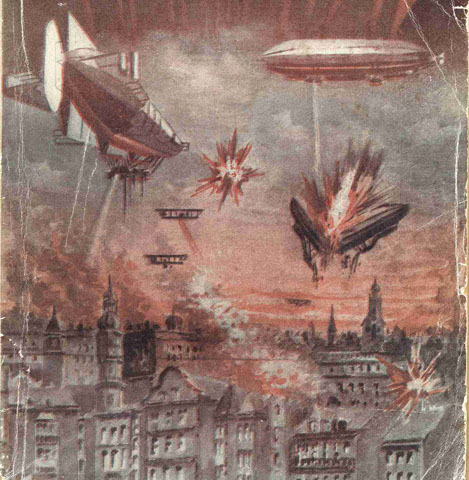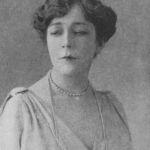The other day I came across a fascinating article by H. L. Mencken, the Sage of Baltimore. Mencken was very interested in colloquial English, and to this end penned “War words in England”, published in the February 1944 American Speech, about new words coming into use in the British press as a result of the war. Some are still familiar today (like decontamination — for some reason I’d never realised it was first used in connection with anti-gas precautions), some are still familiar enough though no longer current (siren-suit, appropriate attire for the lady shelterer), others are long forgotten (at least, they’re new to me, e.g., to spitfire and to hurricane — to shoot down an enemy plane). He generally avoided invented words which never gained much popularity, along with acronyms or words formed from them.
Here are some of the more interesting words listed by Mencken.
First there’s blitzkrieg/blitz and derivatives: blitzfighter, an ‘airman or soldier engaged in fighting against a blitzkrieg‘;1 blitzflu, a ‘mild influenza, sudden in its attack’, which struck during the winters of 1941-2 and 1942-3; blitzlull, a break in a blitz; blitzpeace, a peace offensive by Hitler; fireblitzed, ‘Of an area devastated by air bombardment’; flare-blitz, bombers dropping flares. And of course sitzkrieg, a slow war: according to Newsweek (4 March 1940), in coining this the RAF ‘scored a direct pun on the word blitzkrieg‘. Despite its popularity, there were evidently many people who didn’t like having to use a German word so often — one alternative was to raff (i.e. RAF) a target, another to ruhr it (as in the Ruhr valley, a heavily-industrialised and often-bombed area of western Germany — kind of a reverse coventration). But the Children’s Newspaper thought that the large number of warlike foreign words imported into English perhaps ‘proves that our national genius is for peace rather than war’ (26 July 1941).
Another cluster relates to air raids and associated experiences: flitter, ‘One who sleeps away from home to escape air alarms’ (more usually called a trekker); goofer, someone who doesn’t take shelter during an air raid; jitterbug, `A nervous person’, according to Mencken’s quotes this seems to have a favourite of Cabinet ministers; roof-spotter, somebody watching out for bombers (ie so as to warn the business below that a raid was actually approaching, otherwise work would have to cease everytime an alert sounded); shelteritis, rheumatism; skelter, an air-raid shelter.
Evacuee (from the French evacué) is a word still in use which appears to derive from directly from preparations for air attack in the 1930s; the first use in The Times is from 1938, in the aftermath of Munich. But as with blitzkrieg, there was much resistance at first: ‘Evacuees has a dreadfully alien and official sound, and the novelty of the word is as uncomfortable as new paint’ (Western Evening Herald, 28 October 1939). Many alternatives were proposed, unsuccessfully it seems: pilgrims, shelterers, sojourners, refugees, war guests, ‘Itler’s orphans, movers, exodists/exos (from exodus), dumpees/dumpies, agisters (as though they were farm animals), removee, migrant, transient, scatterer. More successful variants (according to Mencken) were evacuatrix, a female evacuee; guinea-pig, an evacuee or billeted soldier; seavacuation, overseas evacuation, particularly of children; vackie/vack/vickie, abbreviation of evacuee.
Finally, a grab-bag of miscellaneous terms: battle bowler, the helmet worn by soldiers and ARP wardens, a term first heard during the First World War; block-buster, a bomb which can destroy a whole city block (a fun fact to tell students in tutes, I’ve found); bomphlet/bomphleteer, propaganda pamphlets dropped by air and the airmen who drop them; chatter-bug, a civilian who spreads military secrets; parashot/parashooter/paraspotter, Home Guards who are watching for paratroops (itself a new word) — parashot was a very common word in the summer of 1940, which is a testament to the fear of airborne invasion at the time; shiver-sister, a scared civilian (with chatterbug, an invention of Harold Nicolson, apparently); and telefootler, ‘a word for those selfish people who indulge in idle gossip and time-wasting talks on the telephone’ (Herne Bay Press, 1 March 1941). I think this last word should be revived — we all know a telefootler or two, I’m sure.
So the conclusion seems to be that having a war now and then is good for linguistic diversity.
![]() This work is licensed under a Creative Commons Attribution-NonCommercial-NoDerivatives 4.0 International License.
Permissions beyond the scope of this license may be available at http://airminded.org/copyright/.
This work is licensed under a Creative Commons Attribution-NonCommercial-NoDerivatives 4.0 International License.
Permissions beyond the scope of this license may be available at http://airminded.org/copyright/.




